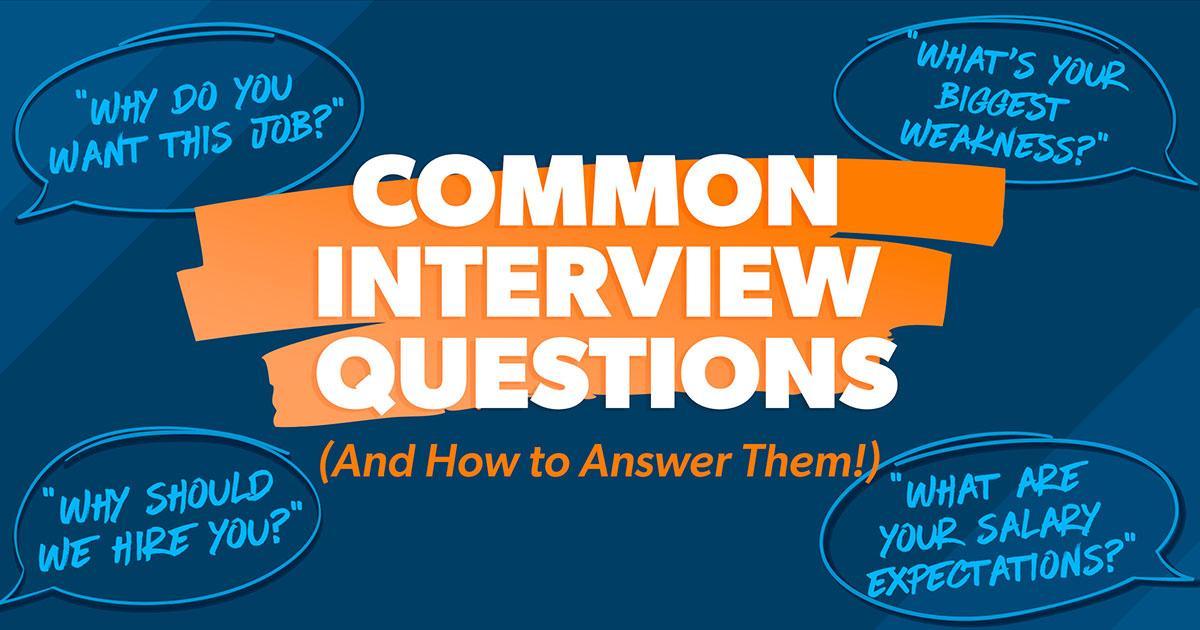Preparing for a job interview can be a daunting task, especially when you don’t know what questions to expect. However, most employers tend to ask similar questions during interviews, making it easier to anticipate and prepare for them. In this blog post, we’ll discuss the top 10 most common interview questions and how to answer them.
10 Common Interview Questions and How to Answer Them
1. Tell me about yourself
This is often the first question asked during an interview. The interviewer wants to know more about you beyond what’s on your resume. Your answer should be brief, and relevant, and highlight your strengths and accomplishments. It’s important to keep your response professional and avoid personal information.
2. Why do you want to work for this company?
The interviewer wants to know if you’ve done your research on the company and if you’re genuinely interested in the position. Your answer should be specific and demonstrate that you understand the company’s mission and values.
3. What are your strengths?
When answering this question, it’s important to focus on skills that are relevant to the job. Be specific and provide examples of how you’ve used these strengths to accomplish tasks in your previous roles.
4. What are your weaknesses?
This question can be tricky to answer. It’s important, to be honest and identify a weakness that’s not crucial to the job. Also, highlight how you’re working to improve on that weakness.
5. Why should we hire you?
This is your chance to sell yourself and convince the interviewer that you’re the best candidate for the job. Highlight your unique skills and experiences that make you a good fit for the position.
6. Can you tell me about a time when you overcame a challenge?
The interviewer wants to know how you handle difficult situations. Use a specific example and highlight how you approached the challenge, the steps you took to resolve it, and the outcome.
7. Where do you see yourself in five years?
This question is meant to gauge your long-term goals and ambitions. Be honest and provide a response that aligns with the position and company you’re interviewing for.
8. What are your salary expectations?
This question can be uncomfortable, but it’s important to have a clear idea of what you’re looking for. Research the average salary for the position and provide a range that’s reasonable based on your experience and qualifications.
9. Do you have any questions for me?
Always have some questions prepared to ask the interviewer. This shows that you’re interested in the position and have done your research. Ask about the company culture, the position, or any specific projects or initiatives.
10. Why are you leaving your current job?
If you’re currently employed, the interviewer may ask why you’re looking for a new job. Be honest and highlight reasons that are related to career growth or new opportunities. Avoid talking negatively about your current employer or coworkers.
What To Avoid During Interviews
To increase your chances of success, here are some things to avoid during interviews:
1. Arriving late
Punctuality is crucial, as it reflects your level of professionalism and respect for the interviewer’s time. Aim to arrive a few minutes early to demonstrate your reliability.
2. Poor body language
Avoid slouching, crossing your arms, or displaying negative facial expressions. Maintain good posture, make eye contact, and show active engagement through attentive listening and nodding.
3. Lack of preparation
Failing to research the company, the role you’re applying for, or common interview questions can signal a lack of interest and preparation. Take the time to understand the company, review your resume, and anticipate potential interview questions.
4. Being untruthful
Honesty is crucial during interviews. Lying about your qualifications, skills, or experience can easily be detected and damage your chances of getting the job. Instead, focus on highlighting your genuine strengths and experiences.
5. Speaking negatively about past employers or experiences
Criticizing previous employers, colleagues, or experiences can create a negative impression. Stay positive and professional when discussing past experiences, emphasizing what you learned and how you grew from them.
6. Over-talking or interrupting
It’s important to strike a balance between providing detailed responses and being concise. Avoid rambling or interrupting the interviewer. Listen carefully, take your time to formulate your responses, and provide relevant information.
7. Inappropriate attire
Dressing inappropriately for an interview can give the impression that you don’t take the opportunity seriously. Dress professionally, adhering to the company’s dress code or opting for business attire if in doubt.
8. Focusing solely on salary or benefits
While compensation is an important factor, emphasizing it too early in the interview process can make you appear solely motivated by money. Instead, focus on showcasing your skills, qualifications, and enthusiasm for the role and the company.
9. Forgetting to ask questions
Toward the end of the interview, when given the opportunity, ask thoughtful questions about the role, the company culture, or any other relevant topics. This shows your genuine interest and engagement.
10. Neglecting follow-up
After the interview, it is crucial to follow up with a thank-you note or email to express your gratitude for the opportunity and reiterate your interest in the position. This simple gesture can leave a positive lasting impression.
By avoiding these common pitfalls, you can enhance your chances of making a positive impression during interviews and increase your chances of securing the job you desire.
In conclusion, preparing for a job interview is essential for increasing your chances of landing a job. By anticipating and practicing responses to common interview questions, you’ll be able to show your skills, experiences, and enthusiasm for the position. Good luck!

